A Mediapart investigation has revealed that a socialist MP used his parliamentary expenses allowance to pay for family holidays and train trips. Pascal Terrasse, a Socialist Party (PS) Member of Parliament for the Ardèche department in south central France, who is seeking a fourth term in June's legislative elections, paid for foreign holidays, train journeys for his family, leisure activities and bar bills out of a fund supposed to be used simply for his activities as a constituency MP. In all, Mediapart estimates that in the last four years Terrasse, who is also president of Ardèche's department council or conseil général, spent around 15,000 euros on family holidays alone out of parliamentary allowances.

Enlargement : Illustration 1

However, Terrasse's is not an isolated case. Instead, it highlights the complete lack of transparency and control over the way elected members of the National Assembly make use of parliamentary expenses, which total 44 million euros a year, with a further 27 million euros for the Senate. When made aware of the Pascal Terrasse case, the authorities at the National Assembly refused to comment to Mediapart other than to repeat what is on their website. Namely that the 6,412 euros monthly expense allowance to MPs was introduced in 1997 to meet “various expenses linked to the carrying out of their mandate and which are not directly paid for or reimbursed by the Assembly”.
Senior MPs have meanwhile told Mediapart that there is little scope within the existing system to sanction parliamentarians, even when abuses are highlighted, and that some Members of Parliament – and senators - routinely treat their expenses allowance simply as another source of income on top of their salary. “But I pay for my shopping with it!” one senator commented when questioned over his allowance. However, an anti-corruption organization claims that “on the face of it” a prosecution could be brought where there is evidence of “misappropriation of public money”. One MP concerned about the “laxness” of the current system has also told Mediapart he fears that it could lead to a full-scale “scandal” such as the one seen in the British parliament in 2009 which led to the resignation of government ministers and the prosecution of British MPs.
In the case of Pascal Terrasse, Mediapart is publishing documentary proof of how he spent part of his 6,412 euro monthly parliamentary expenses allowance or IRFM (indemnité représentative de frais de mandat). The largest expenditure, and the furthest removed from his parliamentary duties, concerns trips abroad taken by the MP. All were in the middle of summer, the school holidays or at weekends.
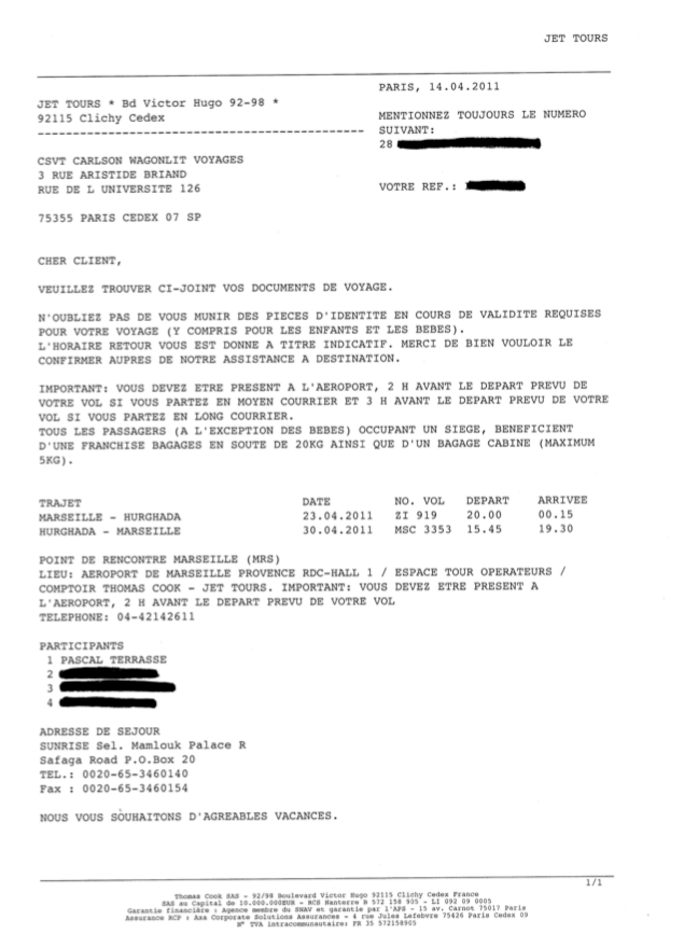
Enlargement : Illustration 2

The most recent example concerns a trip to Egypt. As an email confirming the reservation (see above) and an extract from Terrasse's IRFM account show (see below), the MP went with his wife and children to Egypt from April 23rd to April 30th 2011. The cost of the trip, booked through travel firm Carlson Wagon Lits Voyages, was 3,398.50 euros, charged to the National Assembly. There is little doubt about the nature of the journey. “We wish you an enjoyable holiday,” the email concludes. When questioned by Mediapart about the trip Terrasse had no explanation for it.
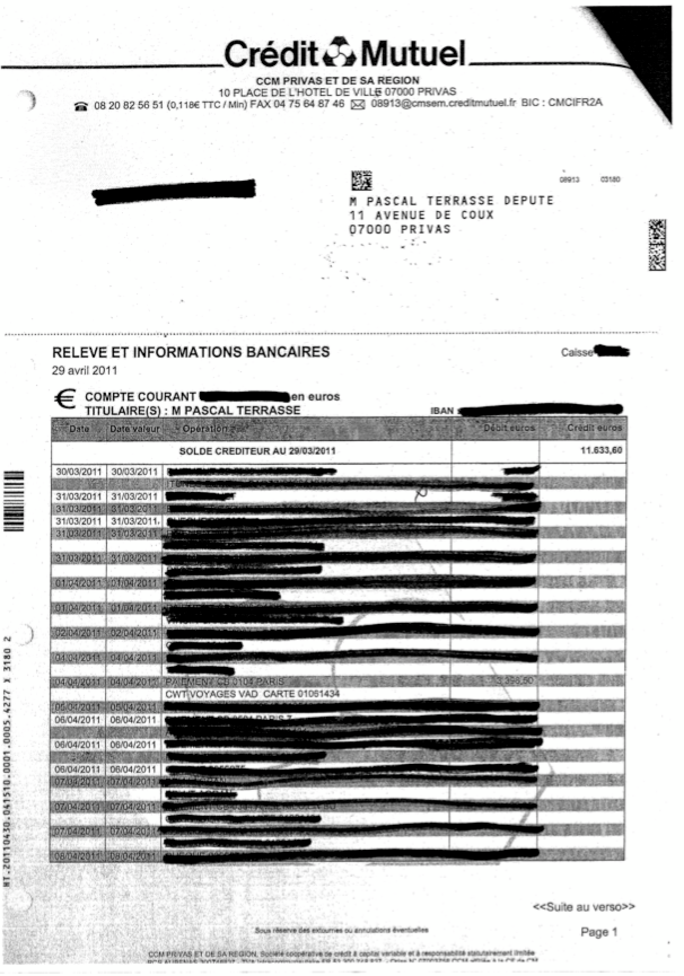
Enlargement : Illustration 3

Another example concerns a trip to Senegal in August 2009. The air tickets alone – bought via the travel site Opodo– were 2,950.80 euros. His IRFM accounts (see below) shows there were also several hundreds of euros in further expenditure. Terrasse told Mediapart the voyage was to attend a “meeting on cooperation on decentralisation” and that he was representing Ségolène Royal, president of the Poitou-Charentes region in west France
Royal is indeed running a programme of cooperation on the subject with the Senegalese region of Fatick. However, a spokesman for Royal's office said they had no knowledge of Terrasse deputising for her. Nor was there any mention of the meeting in the diary at the Ministry of Foreign Affairs, which oversees cooperation on decentralisation. It is still possible such a meeting did occur, and the Ardèche has had links with the Senegalese region of Matam since 1999. So the journey was at best a confusion of roles between those of MP and president of the department council. In reality, though, it was a private family holiday. One of the former drivers at the council, now retired, told Mediapart he recalled Terrasse's return from the trip. “I went to meet him and his wife and children at Geneva Airport,” he said. “They were returning from Africa.”.
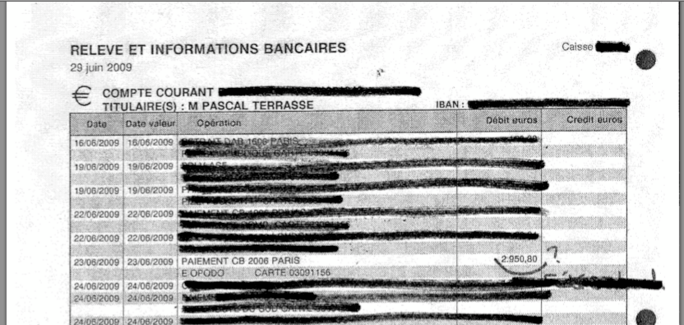
Enlargement : Illustration 4

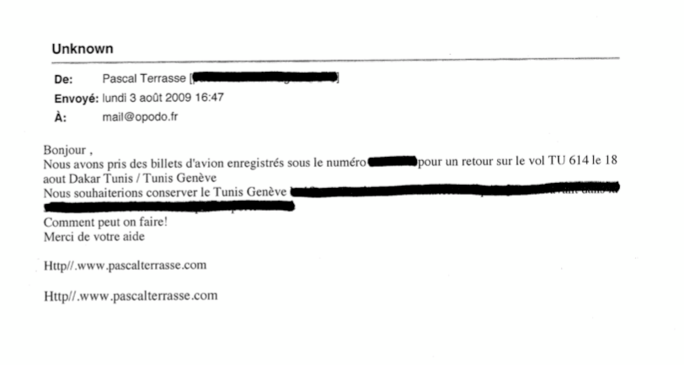
Enlargement : Illustration 5

What can be said about a weekend visit to Barcelona in May 2010 for which hotel, restaurant and leisure bills were met by the MP's debit card on his IRFM account? The total came to around 800 euros. “I can no longer remember,” Terrasse told Mediapart. “Sometimes I make payments on the debit card that I reimburse later.” That was precisely his argument concerning the 5,808 euros and 82 euros paid separately in July 2010 (see below) to the travel firm Look Voyages, which confirms handling a trip for the Terrasse family in August of the same year on the Greek island of Rhodes.
He maintains that he reimbursed his IRFM account in December 2011; to this day he has provided no proof of this. And if he did repay the money that was in any case a year and a half after the expenditure. Terrasse is a member of the Franco-Greek Republic friendship group of the National Assembly, but the Assembly's website has no record of any trip or delegation carried out by this group at this time.
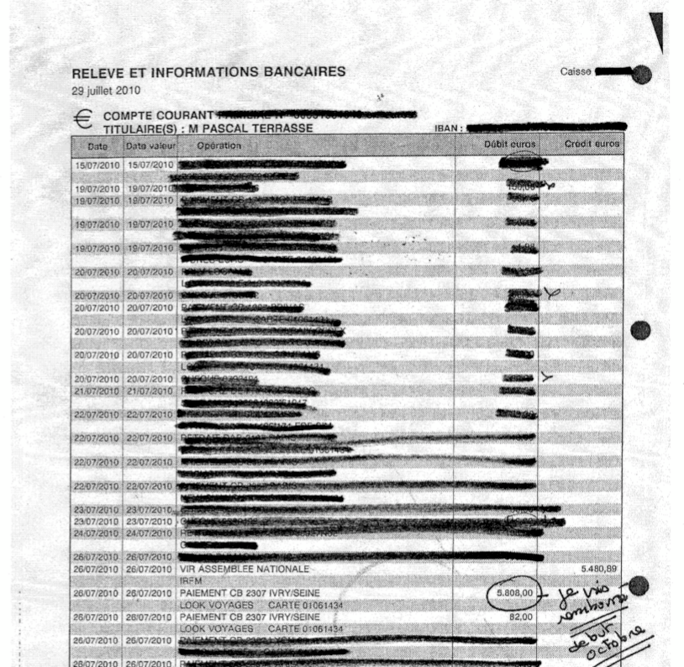
Enlargement : Illustration 6

'Just about all MPs do it'
The only trip listed by Mediapart that the MP admits was of a “personal” nature was one to Cullera in Spain, for the funeral of a friend's father who was originally from a town in the Ardèche. “I accept that this was a private visit,” says Terrasse. The total cost was just over 700 euros.
In addition to using his expense allowance for holidays, Terrasse has also regularly used his allowances as an MP to pay for visits linked to his role as president of the Ardèche department council. For example, in April 2009 he visited a cave system near Bilbao in Spain. Terrasse's argument is that he is overseeing a project involving a prehistoric cave system in the Ardèche. “Next to Bilbao there's the Altamira Cave, and I wanted to see how they organized it,” Terrasse told Mediapart.
However, though the MP is indeed head of the Ardèche organization overseeing the work on the Chauvet cave, that cave is not in his constituency. So the National Assembly paid for his department council duties. “Generally I don't want the department council to pay for everything because, I tell myself, I have an IRFM for that,” he told Mediapart. “It is true that it is to the department council's benefit and to the detriment of the National Assembly.”
As well as mixing up his functions as an elected representative, Terrasse has also confused his work as an elected MP with party politics. For example, he used his parliamentary account to pay for a flight to London – at a little over 800 euros a time – on Socialist Party business. “Just about all the MPs do that,” he claims. Terrasse also pays his 500 euro monthly subscription to the Socialist Party – via the A.F.P.S. or Association du financement du parti socialiste – out of his IRFM expense account (see below). Yet the secretariat for the socialist group of MPs at the National Assembly says the payment of this contribution is made from an MP's personal salary. This party contribution is in fact tax deductible. So Terrasse gets a double benefit, by paying a tax-deductible contribution out of an expense account which itself does not attract income tax.
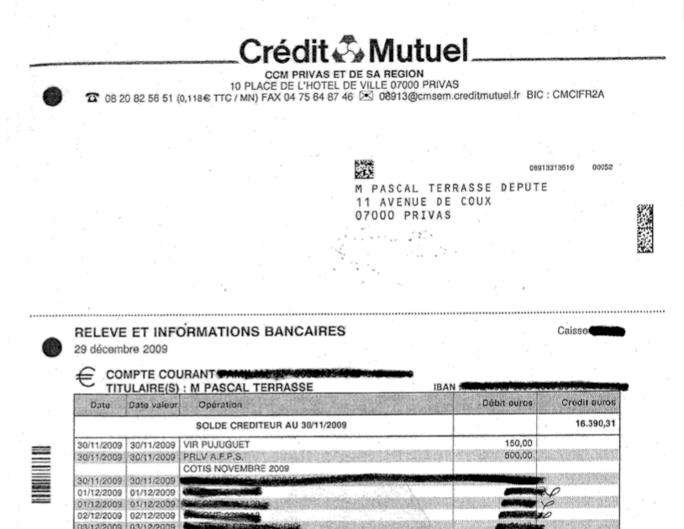
Enlargement : Illustration 7

Mediapart has highlighted other payments made by Terrasse too. For example, on several occasions he has used his parliamentary allowance to buy train tickets for his wife and two children (see below). The MP says that this is when his wife comes to give him a hand with his parliamentary duties. There is also the curious affair of a 150-euro monthly payment to Brigitte Pujuguet, mayor of Saint-Just-d' Ardèche, a commune in the south of the Ardèche department. “When I am in the south Ardèche area I never take my department council driver,” says the MP. And referring to the local mayor he adds: “It is she who drives me in my constituency. So I pay her 150 euros to defray the cost.” If it is indeed for constituency work, then the MP perhaps ought to be using the car that he bought with his parliamentary allowance. If it is department council work, then once again the question arises as to why the National Assembly should pay for it. Pujuguet herself says of the MP: “He doesn't like driving much.”
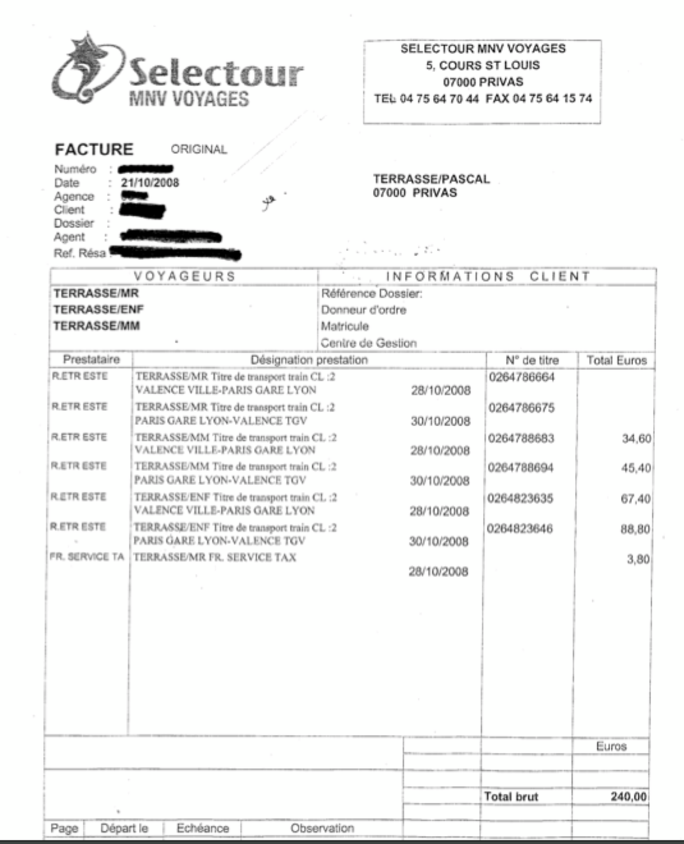
Enlargement : Illustration 8

'But I do my shopping with this allowance!'
Justifying his expenditure Pascal Terrasse says that the financial authorities at the National Assembly “have confirmed to me that the IRFM is linked to my function as an elected representative in the broad sense of the term”. He also insists that he is a supporter of greater transparency in parliamentary expenses. “There is a long way to go over the use of the IRFM funds, how they are used and justified,” he told Mediapart. And he suggests that there should be an “ethics charter at the National Assembly”.
Yet he was not present at the Assembly on December 7 th 2011 when it debated a proposed law on financial transparency in politics. Put forward by Green MP François de Rugy from the Loire-Atlantique, it would have required both MPs and senators to make public their use of the expense allowance. It was rejected. Terrasse says: “I wasn't aware of it.”
As last year’s law proposal shows, a number of politicians have already expressed concerns about the lack of openness about MPs' expenses amid fears that it damages all their reputations – and that of parliament and politics as a whole. “There is no rigour in political life,” says Charles de Courson, MP for the centrist Nouveau centre party in the Marne. “And those who try to instill some are seen as troublemakers. And it is this culture of laxity that leads to anti-parliamentary feeling.” De Rugy, sponsor of last year’s law proposal, agrees. “It's the absence of transparency that leads to this anti-parliamentary sentiment.”
One problem highlighted by politicians is that new MPs are left to their own devices when it comes to how to use their expenses, or are even encouraged to bend the rules. “There are no written instructions when you become a parliamentarian,” says de Courson. “That doesn't excuse anything but it shows that, fundamentally, no one wants there to be any discipline. It's a completely closed system and you do what you want with this money. So when they have become MPs again, some former ministers who have seen their salaries fall, have told me cynically: 'Me, I put all my IRFM in my pocket.'”
De Courson says he was once asked to speak to a group of senators about the financial rules governing political life, including the IRFM. “One elected representative told me: 'But Charles, I pay for my shopping with this allowance!'”
Other MPs similarly concerned about the way their expenses are handled proposed another law, in addition to the one put forward by François de Rugy. This more detailed proposal in 2011 was drawn up by two MPs from the conservative right party the UMP, Lionnel Luca and Daniel Spagnou, and was backed by a cross-party selection of 17 MPs. It proposed that at the end of parliamentary session MPs and senators would have to make their expenses claims with proof of how the money was spent. The law would also have meant spot-checks on claims, and any money left unclaimed by parliamentarians was to be returned to the National Assembly coffers. This bill was also rejected.
Mediapart has spoken to a number of those who sponsored the bill including centre-right Radical Party MP for the Territoire de Belfort in north-eastern France, Michel Zumkeller, who says MPs need to come in line with the rest of the working population. “We are the only workers in France who don't have to justify their expenditure. In whatever industry, expenses are subject to controls.”
UMP MP Jean-Pierre Decool, who describes himself as an “old Gaullist” has a similar view. “In the semicircle [ the benches of the National Assembly ] I sat next to Jean de Gaulle. He often reminded me that his grandfather, the general [General De Gaulle, President of France from 1959 to 1969] had an electricity meter installed when he arrived at the Elysée, so he could pay his own expenses.”
Decool added: “As an UMP MP I have defended the idea of a golden rule for state expenditure; I cannot, at the same time, accept that a colleague goes on holiday with IRFM. Today we are seen as 'all corrupt'; we have to heal this fracture between the electors and the political world. I expect the future majority in the Assembly to act on this matter.”
Misappropriation of public money?
Another signatory of the bill, Jean Lassalle, MP for the centrist Moden party in the Pyrénées-Atlantiques in southwest France, says that tougher controls on MPs' expenses would encourage he and others to organise their finances better. “I am clean, but if there were to be an audit on my accounts today I'm not sure I would have no problems. An MP is always in a hurry...sometimes I don't have the right chequebook with me. If the expenses were inspected then, at least, it would force me to be completely rigorous. And I am sure that many MPs are in the same position as me.”
For Lassalle, failure to reform the system carries a great risk. “Today we are at risk from a series of revelations, like in England, and that a scandal breaks.”
Using an argument that was widely heard during the expenses scandal in Britain, a number of MPs here suggest that expenses are high because they compensate for what is seen by some as a relatively low salary; French MPs receive 7,100.15 euros a month gross. Some apparently regard the expenses as a “second salary”. Jean Lassalle told Mediapart: “In view of our responsibilities is it right that we have the same salary as a middle-manager at [oil company] Total? I would be more at home with a framework of transparency, even if it means are salary is increased.”
Socialist MP René Dosière, who represents part of the Aisne department in the north of the country and who is author of the L'Argent de l'État (“The state's money”), says: “It's clear that over the course of time the IRFM was increased because they could not increase parliamentary salaries, it was too sensitive. So some consider that the IRFM to be a supplementary income.”
So far the authorities at the National Assembly have not responded to Mediapart's revelations and questions other than to repeat what is on their website. This is that the 6,412 euros available in allowances to MPs each month was introduced in 1997 to meet “various expenses linked to the carrying out of their mandate and which are not directly paid for or reimbursed by the Assembly”.
There is also some doubt among senior MPs in the assembly about how realistic it is to have greater scrutiny of parliamentary allowances. Richard Mallié, a UMP MP for the Bouches-du-Rhône, and one of the Assembly's three quaestors in charge of financial matters affecting members believes it would take “40 to 60 officials” to oversee the expenses, making it impossible to manage. “If there are some MPs who...oh well, good for them, let's put it like that. I consider that the game is not worth the candle.”
However, could MPs be prosecuted for misuse of public funds under the existing system, if there is proof? René Dosière is doubtful. “Legally, there is no recourse,” he says. However, the anti-corruption organization Anticor (Association de lutte contre la corruption) believes there could be action taken against errant MPs. “Concerning public money intended to be used in the carrying out of an MP's duties, if it is proven that the use is non-professional, then this could be misappropriation of public money,” says Anticor's lawyer Jérôme Karsenti. “Provided it can be proven. If the association decided to take up this issue, then indeed it could make a formal complaint.”
The organisation’s spokeswoman Séverine Tessier agrees. “On the face of it I see no legal obstacle to there being proceedings based on the misappropriation of public money,” she says.
--------------------------------
English version: Michael Streeter


